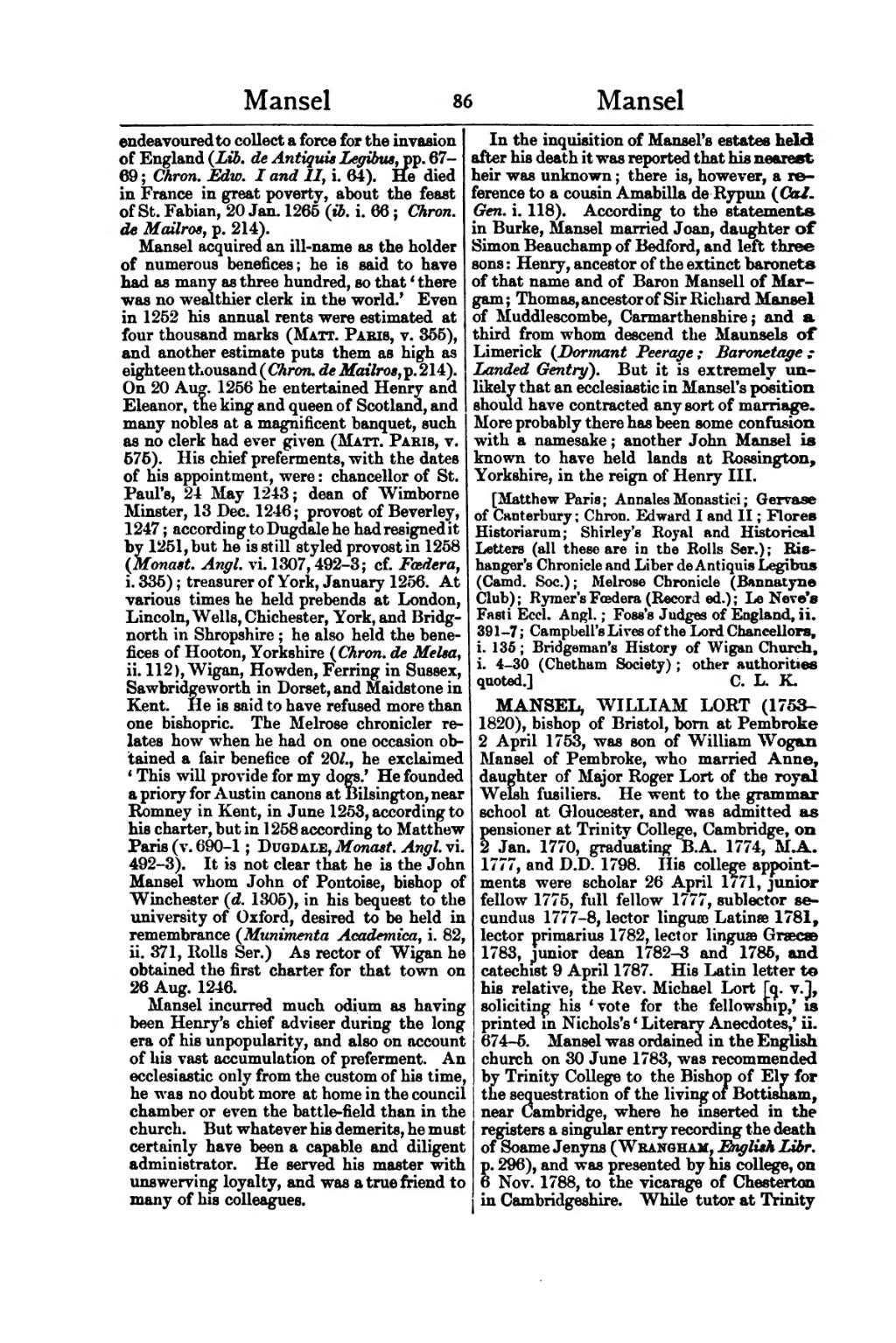endeavoured to collect a force for the invasion of England (Lib. de Antiquis Legibus, pp. 67-69; Chron. Edw. I and II, i. 64). He died in France in great poverty, about the feast of St. Fabian, 20 Jan. 1265 (ib. i. 66; Chron. de Mailros, p. 214).
Mansel acquired an ill-name as the holder of numerous benefices; he is said to have had as many as three hundred, so that 'there was no wealthier clerk in the world.' Even in 1252 his annual rents were estimated at four thousand marks (Matt. Paris, v. 355), and another estimate puts them as high as eighteen thousand (Chron. de Mailros, p. 214). On 20 Aug. 1256 he entertained Henry and Eleanor, the king and queen of Scotland, and many nobles at a magnificent banquet, such as no clerk had ever given (Matt. Paris, v. 575). His chief preferments, with the dates of his appointment, were: chancellor of St. Paul's, 24 May 1243; dean of Wimborne Minster, 13 Dec. 1246; provost of Beverley, 1247; according to Dugdale he had resigned it by 1251, but he is still styled provost in 1258 (Monast. Angl. vi. 1307, 492-3; cf. Fœdera, i. 335); treasurer of York, January 1256. At various times he held prebends at London, Lincoln, Wells, Chichester, York, and Bridgnorth in Shropshire; he also held the benefices of Hooton, Yorkshire (Chron. de Melsa, ii. 112), Wigan, Howden, Ferring in Sussex, Sawbridgeworth in Dorset, and Maidstone in Kent. He is said to have refused more than one bishopric. The Melrose chronicler relates how when he had on one occasion obtained a fair benefice of 20l., he exclaimed 'This will provide for my dogs,' He founded a priory for Austin canons at Bilsington, near Romney in Kent, in June 1253, according to his charter, but in 1 258 according to Matthew Paris (v. 690-1; Dugdale, Monast. Angl. vi. 492-3). It is not clear that he is the John Mansel whom John of Pontoise, bishop of Winchester (d. 1305), in his bequest to the university of Oxford, desired to be held in remembrance (Munimenta Academica, i. 82, ii. 371, Rolls Ser.) As rector of Wigan he obtained the first charter for that town on 26 Aug. 1246.
Mansel incurred much odium as having been Henry's chief adviser during the long era of his unpopularity, and also on account of his vast accumulation of preferment. An ecclesiastic only from the custom of his time, he was no doubt more at home in the council chamber or even the battle-field than in the church. But whatever his demerits, he must certainly have been a capable and diligent administrator. He served his master with unswerving loyalty, and was a true friend to many of his colleagues.
In the inquisition of Mansel's estates held after his death it was reported that his nearest heir was unknown; there is, however, a reference to a cousin Amabilla de Rypun (Col. Gen. i. 118). According to the statements in Burke, Mansel married Joan, daughter of Simon Beauchamp of Bedford, and left three sons: Henry, ancestor of the extinct baronets of that name and of Baron Mansell of Margam; Thomas, ancestor of Sir Richard Mansel of Muddlescombe, Carmarthenshire; and a third from whom descend the Maunsels of Limerick (Dormant Peerage: Baronetage: Landed Gentry). But it is extremely unlikely that an ecclesiastic in Mansel's position should have contracted any sort of marriage. More probably there has been some confusion with a namesake; another John Mansel is known to have held lands at Rossington, Yorkshire, in the reign of Henry III.
[Matthew Paris; Annales Monastici; Gervase of Canterbury; Chron. Edward I and II; Flores Historiarum; Shirley's Royal and Historical Letters (all these are in the Rolls Ser.); Rishanger's Chronicle and Liber de Antiquis Legibus (Camd. Soc); Melrose Chronicle (Bannatyne Club); Rymer's Fœdera (Record ed.); Le Neve's Fasti Eccl. Angl.; Foss's Judges of England, ii. 391-7; Campbell's Lives of the Lord Chancellors, i. 135; Bridgeman's History of Wigan Church, i. 4-30 (Chetham Society); other authorities quoted.]
MANSEL, WILLIAM LORT (1753–1820), bishop of Bristol, born at Pembroke 2 April 1753, was son of William Wogan Mansel of Pembroke, who married Anne, daughter of Major Roger Lort of the royal Welsh fusiliers. He went to the grammar school at Gloucester, and was admitted as pensioner at Trinity College, Cambridge, on Jan. 1770, graduating B. A. 1774, M.A. 1777, and D.D. 1798. His college appointments were scholar 26 April 1771, junior fellow 1775, full fellow 1777, sublector secundus 1777-8, lector linguae Latinae 1781, lector primarius 1782, lector lingua Græcæ 1783, junior dean 1782-3 and 1785, and catechist 9 April 1787. His Latin letter to his relative, the Rev. Michael Lort [q. v.], soliciting his 'vote for the fellowship,' is printed in Nichols's ' Literary Anecdotes,' ii. 674-5. Mansel was ordained in the English church on 30 June 1783, was recommended by Trinity College to the Bishop of Ely for the sequestration of the living of Bottisham, near Cambridge, where he inserted in the registers a singular entry recording the death of Soame Jenyns (Wrangham, English Libr. p. 296), and was presented by his college, on 6 Nov. 1788, to the vicarage of Chesterton in Cambridgeshire. While tutor at Trinity
